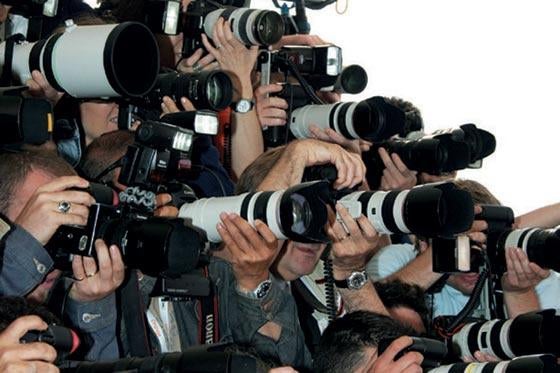
Photographers covering demonstrations are regularly recorded, shoved and assaulted by police, Press Gazette has been told.
They have spoken of police covering their lenses and being ordered to hand over their photos.
Others said they are so well documented, they are known to vast numbers of police officers.
Their concerns come after The Guardian published a video made by Kent Police at a climate demonstration.
It showed photographers and cameramen being extensively filmed, with one officer saying: “I trust them [journalists] less than the protestors.”
At the Kent demonstration, photographers were even filmed through the window of a McDonald’s restaurant as they filed their work.
David Hoffman, a veteran of covering demonstrations, told Press Gazette last month that he was repeatedly kicked by police at a protest in October.
He said today that The Guardian’s video evidence of surveillance was “no surprise”.
“Since the turn of the century it has been getting worse,” he said. “More obstruction, hands in lenses, grabbing cameras. All these things happen with increasing frequency.
“I remember last year I was shoved into a demonstration that I was trying to take photos of from outside.”
He said new laws, such as the 2000 Terrorism Act – which includes stop and search powers – and the Police and Criminal Evidence Act, helped police feel “invulnerable”.
Hoffman said more training – and more “good apples” – were needed in the police.
“When I was being kicked, a number of other officers would have been quite aware and they made no effort to stop it,” he said.
“Clearly they were giving tacit approval, and if I complained they would say they didn’t see anything.”
He added guidelines on media-police relations, agreed with the Association of Chief Police Officers in 2006 and adopted by all forces in April 2007, were not known by many officers.
The guidelines state: “We [police] should actively help them [media] carry out their responsibilities, provided they do not interfere with ours.”
But Hoffman said: “We have spoken to a number of officers, from chief constables to PCs, and they say they haven’t seen the guidelines.”
Photographers have recently met the Police Federation – the officers’ representative body – to discuss how the guidelines can be more widely known.
‘Police don’t like to be seen as criminals’
Photographer Pete Jenkins said The Guardian’s video proved police were focusing on photographers – despite past denials.
He said: “It’s happened for as long as I can remember. I covered the miners’ strike, and the steel workers’ dispute – even in those days there were people surveying you.
“On one hand you can understand, where perfectly legitimate photographers can look like protestors. In a difficult situation there’s not always time to interview everyone.
“Having said that, there’s no excuse for the way they have behaved on a number of occasions. I know of a number of occasions where photographers have been abused, been battered about.
“We want to be able to take photos of who we want, and they want to be able to take them back.
“Where there has been a problem is when police exceed their powers – treating photographers as criminals and not professionals.”
Jenkins added: “I have no problem with 99 per cent of police. But I have been asked not to take pictures. They have no right. I have been asked to show them my pictures. They have no right.
“The problem goes back to the disputes I mentioned. There’s no question that on occasion, under pressure, some police have acted wrongly. Truncheon-ing, abusing.
“If you see someone truncheoned or kicked and you photo it, you are photographing a crime. Police don’t like to be seen as criminals. It doesn’t happen that often but it does happen.”
‘What happened was a disgrace’
Photographer Andrew Wiard said Jess Hurd’s interview with The Guardian – in which she revealed she had been held by police, and told she may be a terrorist, after taking photos of a wedding – were particularly worrying.
‘It’s time the police came clean about whether or not they are holding photos of press photographers in their criminal intelligence database,’he said.
‘It’s also time they stopped treating verified holders of the national press card as terrorist suspects. What happened to Jess Hurd in Docklands was a disgrace. They have yet to apologise.”
A spokeswoman for the Metropolitan Police said officers were trained to deal with the media.
“The MPS recognises the important role that the media plays, and their rights to stories,” she said.
“Senior officers have met with various representatives from bodies who represent the interests of photographers and we have sought to protect their rights to do their job through educating colleagues within the MPS.
“Before every operation all our staff are briefed as to the rights and role of the media and wherever operationally possible to facilitate them.
“We have worked in consultation with media representatives and organisations to produce guidelines, which have since been adopted by ACPO.
“Senior officers within the MPS will continue to drive forward this work. Any allegations or complaints about police treatment of photographers is taken very seriously by the MPS.”
Email pged@pressgazette.co.uk to point out mistakes, provide story tips or send in a letter for publication on our "Letters Page" blog
